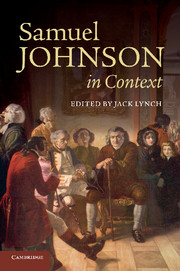Book contents
- Frontmatter
- Contents
- Illustrations
- Contributors
- Preface
- Chronology
- Abbreviations
- Part I Life and works
- Part II Critical fortunes
- Part III Contexts
- Chapter 10 America
- Chapter 11 Anglicanism
- Chapter 12 Anthropology
- Chapter 13 Authorship
- Chapter 14 Biography
- Chapter 15 Book trade
- Chapter 16 Clubs
- Chapter 17 Conversation
- Chapter 18 Dictionaries
- Chapter 19 Domestic life
- Chapter 20 Education
- Chapter 21 Empire
- Chapter 22 Essays
- Chapter 23 Fiction
- Chapter 24 History
- Chapter 25 Journalism
- Chapter 26 Law
- Chapter 27 Literary criticism
- Chapter 28 London
- Chapter 29 Medicine
- Chapter 30 Mental health
- Chapter 31 Money
- Chapter 32 Nationalism
- Chapter 33 Philosophy
- Chapter 34 Poetry
- Chapter 35 Politics
- Chapter 36 Scholarship
- Chapter 37 Science and technology
- Chapter 38 Scotland
- Chapter 39 Sermons
- Chapter 40 Shakespeare
- Chapter 41 Slavery and abolition
- Chapter 42 Social hierarchy
- Chapter 43 Theatre
- Chapter 44 Travel
- Chapter 45 Visual arts
- Chapter 46 War
- Chapter 47 Women writers
- Further reading
- Index
- References
Chapter 20 - Education
from Part III - Contexts
Published online by Cambridge University Press: 05 June 2012
- Frontmatter
- Contents
- Illustrations
- Contributors
- Preface
- Chronology
- Abbreviations
- Part I Life and works
- Part II Critical fortunes
- Part III Contexts
- Chapter 10 America
- Chapter 11 Anglicanism
- Chapter 12 Anthropology
- Chapter 13 Authorship
- Chapter 14 Biography
- Chapter 15 Book trade
- Chapter 16 Clubs
- Chapter 17 Conversation
- Chapter 18 Dictionaries
- Chapter 19 Domestic life
- Chapter 20 Education
- Chapter 21 Empire
- Chapter 22 Essays
- Chapter 23 Fiction
- Chapter 24 History
- Chapter 25 Journalism
- Chapter 26 Law
- Chapter 27 Literary criticism
- Chapter 28 London
- Chapter 29 Medicine
- Chapter 30 Mental health
- Chapter 31 Money
- Chapter 32 Nationalism
- Chapter 33 Philosophy
- Chapter 34 Poetry
- Chapter 35 Politics
- Chapter 36 Scholarship
- Chapter 37 Science and technology
- Chapter 38 Scotland
- Chapter 39 Sermons
- Chapter 40 Shakespeare
- Chapter 41 Slavery and abolition
- Chapter 42 Social hierarchy
- Chapter 43 Theatre
- Chapter 44 Travel
- Chapter 45 Visual arts
- Chapter 46 War
- Chapter 47 Women writers
- Further reading
- Index
- References
Summary
Educa′tion. n.s. [from educate.] Formation of manners in youth; the manner of breeding youth; nurture.
Education and instruction are the means, the one by use, the other by precept, to make our natural faculty of reason both the better and the sooner to judge rightly between truth and error, good and evil. Hooker, b. i. s. 6.
It is seldom recalled that Johnson pursued his vocation as a writer against the background of repeated attempts to become a teacher. Before arriving in London in 1737 he worked as an usher or assistant schoolmaster in Market Bosworth Grammar School, acted briefly as private tutor in the family of Thomas Whitby, opened a boarding school at Edial near Lichfield, and applied unsuccessfully for at least four teaching posts. From his work as a classroom educator, Johnson brought to his writing career an engagement with the debates of the period regarding pedagogical methods, curricula, and the process of learning generally. His periodical essays often address the moral and social instruction of youth, and Catherine Neal Parke has examined “Rasselas as a parable about how teaching and learning are central to human relationships.” A tour of Scotland enabled him to compare the provision of schooling in two countries, while the theme of education serves as one of the unifying motifs of his biographical writings.
Philosophical fascination
Conceptions of childhood were evolving in the eighteenth century in response to changing social conditions and new ideas of how knowledge was acquired. The belief that the infant was inherently sinful, expressed forcefully by St. Augustine, was increasingly giving way to a developmental model of childhood, founded on John Locke’s theory that children were potentially rational beings as yet uninformed by experience. This view gained ascendancy in the first decades of the century, and proved especially influential with middle-class parents increasingly involved in their children’s education. In the latter half of the century, Jean-Jacques Rousseau, in his widely read Emile (1762), proposed that the naturally moral child should be liberated from the routines of traditional learning and educated in the natural world – a philosophy that had minimal impact on mainstream English education in the period, owing to its focus on private education and later association with French radicalism.
- Type
- Chapter
- Information
- Samuel Johnson in Context , pp. 174 - 181Publisher: Cambridge University PressPrint publication year: 2011



